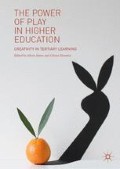Abstract
Primary education students are amazing young people. As both undergraduate learners and developing professionals, they are preparing to be primary school teachers, charged with the responsibility of nurturing children’s thirst for knowledge and fascination with the world. Experiences founded in playful approaches value different ways of knowing. Our work is rooted in place-based education. We frame our work in transactional ways of relational knowing (Dewey in John Dewey: The Later Works. University of South Illinois Press, Carbondale, 1929) and present spirited explorations as a curation of our tutor, student and place stories. Place responsive pedagogies foster personal and professional development, which are deeply serious in intent, yet light-hearted in execution.
Access this chapter
Tax calculation will be finalised at checkout
Purchases are for personal use only
References
Bonnett, M. (2007). Environmental Education and the Issue of Nature. Journal of Curriculum Studies,39(6), 707–721.
Buckley, A. (1879). The Fairyland of Science. Chapel Hill, NC: Republished by Yesterday’s Classics.
Deutsche Welle. http://www.dw.com/en/the-sciencce-of-taking-a-walk/a-2374179. Accessed June 30, 2017.
Department for Education. (2012). Teachers’ Standards. Available at https://www.gov.uk/government/publications/teachers-standards. Accessed June 30, 2017.
Dewey, J. (1938). Experience and Education. New York: Kappa Delta Pi.
Fettes, M. (2005). Imaginative Transformation in Teacher Education. Teaching Education,16(1), 3–11.
Greene, M. (2000). Releasing the Imagination: Essays on Education, the Arts, and Social Change. San Francisco: Jossey-Bass.
Hicks, D. (2014). Educating for Hope in Troubled Times: Climate Change and the Transition to a Post-carbon Future. Stoke-on-Trent: Trentham Books.
Huebner, D. (1999). The Lure of the Transcendent. London: Routledge.
James, A., & Brookfield, S. D. (2014). Engaging Imagination: Helping Students Become Creative and Reflective Thinkers. San Francisco: Jossey-Bass.
Judson, G. (2010). A New Approach to Ecological Education. Engaging Students’ Imaginations in Their World. New York: Peter Lang.
Judson, G. (2016). Three Toolkits to Help Maximize Student Learning & Engagement. Available at http://gettingsmart.com/2016/07/nurture-heart-learning/. Accessed October 27, 2016.
Kidd, D. (2015). Becoming Mobius. The Complex Matter of Education. Carmarthen: Crown House Publishing.
Kind, S. (2006). Of Stones and Silences: Storying the Trace of the Other in the Autobiographical and Textile Text of Art/Teaching (Unpublished doctoral dissertation). University of British Columbia, Canada.
Louv, R. (2005). Last Child in the Woods. Chapel Hill, NC: Algonquin Books.
Mabey, R. (1986). Gilbert White—A Biography. London: Century Hutchinson.
MacFarlane, R. (2014). Landmarks. London: Penguin.
Paulsen, F., & Perry, E. D. (1895). The German Universities: Their Character and Historical Development. New York and London: Macmillan.
Payne, P. G. (2010). Remarkable-Tracking, Experiential Education of the Ecological Imagination. Environmental Education Research,16(3–4), 295–310.
Payne, P. G., & Wattchow, B. (2009). Phenomenological Deconstruction, Slow Pedagogy, and the Corporeal Turn in Wild Environmental/Outdoor Education. Canadian Journal of Environmental Education,14, 15–32.
Pollard, A. (2014). Reflective Teaching in Schools. London: Bloomsbury.
Rice, L. (2009). Playful Learning. Journal for Education in the Built Environment,4(2), 94–108.
Rodaway, P. (2011). Sensuous Geographies. London: Routledge.
Seymour, M., & Witt, S. (2014, Spring). La Chasse à l’Ours: A Journey Exploring Teacher Trainees. Attitudes to Primary Foreign Language Teaching. Francophonie. Available at http://journals.all-languages.org.uk/2014/05/la-chasse-a-lours-a-journey-exploring-teacher-trainees-attitudes-to-primary-foreign-language-teaching/. Accessed September 3, 2016.
Sobel, D. (2008). Childhood and Nature: Design Principles for Educators. Portland, ME: Stenhouse Publishers.
Somerville, M. J. (2008). ‘Waiting in the Chaotic Place of Unknowing’: Articulating Postmodern Emergence. International Journal of Qualitative Studies in Education,21(3), 209–220.
Tovey, H. (2007). Playing Outdoors. Maidenhead: Open University Press.
Trueit, D., & Doll, W. E. (2010). Thinking Complexly, Being-in-Relation. In D. Osberg & G. Biesta (Eds.), Complexity Theory and the Politics of Education. Rotterdam: Sense Publishers.
Ward, E. (2016). Playful in Execution, Serious in Intent. Developing a Research Culture in Learning and Engagement at the Whitworth and Manchester Museum. Available at http://bit.ly/1Swf82O. Accessed October 24, 2016.
Wattchow, B., & Brown, M. (2011). A Pedagogy of Place. Clayton: Monash University Publishing.
Witt, S., & Clarke, H. (2012, July 12). Selborne: A Place of Responses; a Cross-Curricular Opportunity for ITE Students to ‘Watch Narrowly’. In The UK TE Network for Education Sustainable Development/Global Citizenship Fifth Annual Conference. London South Bank University.
Author information
Authors and Affiliations
Corresponding author
Editor information
Editors and Affiliations
Rights and permissions
Copyright information
© 2019 The Author(s)
About this chapter
Cite this chapter
Clarke, H., Witt, S. (2019). Exploration: Playing with Place—Responding to Invitations. In: James, A., Nerantzi, C. (eds) The Power of Play in Higher Education. Palgrave Macmillan, Cham. https://doi.org/10.1007/978-3-319-95780-7_9
Download citation
DOI: https://doi.org/10.1007/978-3-319-95780-7_9
Published:
Publisher Name: Palgrave Macmillan, Cham
Print ISBN: 978-3-319-95779-1
Online ISBN: 978-3-319-95780-7
eBook Packages: EducationEducation (R0)

